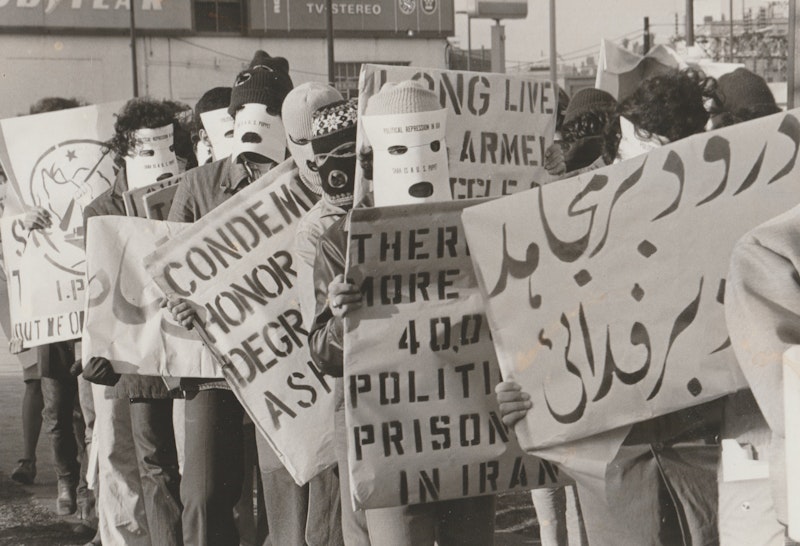It wasn’t surprising that The New York Times published a front-page story comparing the current Gaza protests—some on campuses, some blocking bridges and airports—to those during the Vietnam War in the 1960s and early-1970s. (The latter petered out not only because Richard Nixon ended the draft, but also the Kent State killings on May 4th, 1970, which understandably made less-committed students nervous.) Michael Wines’ story, “In Campus Protest Over Gaza, Echoes of Outcry Over Vietnam,” ran on Christmas Eve, which struck me as odd timing since it’s a day when most Americans don’t pay attention to the media; maybe his editors wanted to bury the long story (by today’s standards) but then again, the motives of whatever editors are left at the Times is mysterious.
Wines comes to no conclusions about whether the Gaza protests will endure, a fair assessment since the current conflict isn’t yet three months old. He writes: “It is too early to know whether the Israeli-Palestinian conflict will define this generation as opposition to the Vietnam War did for many young people more than a half century ago.” I think that’s a weird generalization from the 72-year-old Wines, since numerous factors “defined” the Boomer generation: Vietnam, pop music, sexual freedom, marijuana, psychedelics and the full blossoming of TV. Wines’ article does have a whiff of nostalgia, as four the men he interviewed were members of the S.D.S. in the 1960s, including a couple of now-older academics, a former politician and a retired lawyer.
Larry Gross, an “expert on media and culture at the University of Southern California (S.D.S. status not mentioned, but he’s a graybeard too, beginning his teaching career in 1968)—every Times story requires an “expert”; you pick your expert, I’ll pick mine—said Israeli leaders didn’t “adapt their message” to the young, and “I think it’s one of those generational shifts.” Wines’ story quoted just two people under the age of 40, a curious (or maybe not) omission since the action on behalf of Palestine is run by young people.
I’d say that Covid was far more responsible for a “generational shift,” but perhaps in time “expert” Gross will be proven correct.
As a teenager I attended, and marched, in a lot of anti-Vietnam War protests, and gave a speech at a junior high school assembly on Moratorium Day on October 15th 1969; in 1970 there was the first Earth Day, which was a mellow party, and a vigil for the murdered Kent State students at Huntington’s Village Green. I remember seeing an older friend who was a student at Kent State, who said, when asked why he was back, “I got the first fucking bus out of Ohio.” Protests over so many issues were regular occurrences back then. In 1971, as a 10th-grader at Huntington High School I happily “sat in” all day in the school’s lobby on April 8th, a demonstration of behalf of black students who demanded national holidays for Martin Luther King Jr. and Malcolm X—the organizer, no surprise, was white, and I still chuckle when recalling at the end of the activity, I overheard him say to a fellow (white) leader, “That was a long day, man, let’s get stoned!”
There were protests on and off campus (living in Baltimore as a young journalist I often traveled to Washington, D.C. for such events) in the late-1970s and 1980s— gay rights, environment teach-ins (pre-global warming/climate change) apartheid in South Africa (I reported on the mock shantytowns on the Johns Hopkins campus in 1986, and watched as the small crowd was led, by megaphone, by a no-doubt earnest student, who nevertheless included in his speech, “It’s true this is an ego trip for me, but that doesn’t diminish the cause”), “no nukes” and for nearly three years (mostly) young people demonstrated against the Shah of Iran, the U.S. puppet installed in Tehran in 1953, who was an American ally and while his regime modernized Iran there was well-documented brutality, often instigated by the Shah’s “intelligence network” SAVAK. Jimmy Carter, the “human rights” president, called Iran “an island of stability” in late-1977—and allowed the Shah to come to the U.S. for medical treatment in 1979—which backfired politically on the perpetually out-of-luck “I’ll never lie to you president” and gave fresh momentum to protesters in the Western world.
The picture above is one of many taken by the late David Porter, who worked at the Johns Hopkins News-Letter when I was editor and briefly for City Paper. The campus, and adjacent areas in Baltimore saw scores of demonstrations, which were virulent if not huge.
Take a look at the clues to figure out the year: Winter Olympics (yawn) begin in Innsbruck; John Lennon finally gets his green card; Sara Jane Moore is sentenced to life in prison; United States vetoes a United Nation resolution for an independent Palestinian state; Cillian Murphy is born and Martin Heidegger dies; Yuba City bus crash kills 28 students and one teacher; reporter Don Bolles and diplotmat Orlando Letelier are assassinated; the Seattle Seahawks and Tampa Bay Buccaneers play their first football games; Mark Fidrych wins MLB’s rookie of the year; Rainer Werner Fassbinder films and releases Chinese Roulette with Anna Karina; California’s sodomy law is repealed; Alicia Silverstone is born and Sal Mineo dies; Tom Robbins’ Even Cowgirls Get the Blues is published; “Afternoon Delight” stinks up radio stations, partially offset by “The Rubberband Man; and sportswriter Red Smith wins the “Commentary” Pulitzer Prize.
—Follow Russ Smith on Twitter: @MUGGER2023

